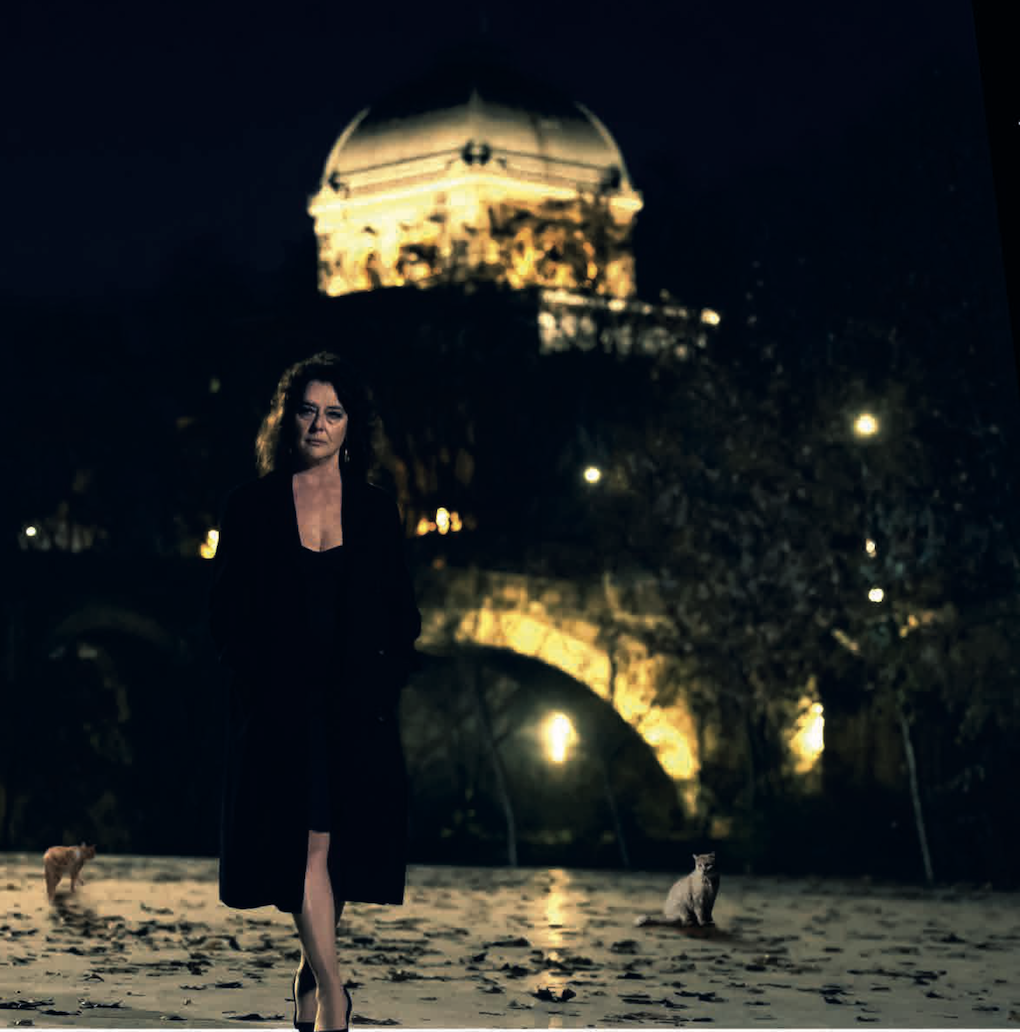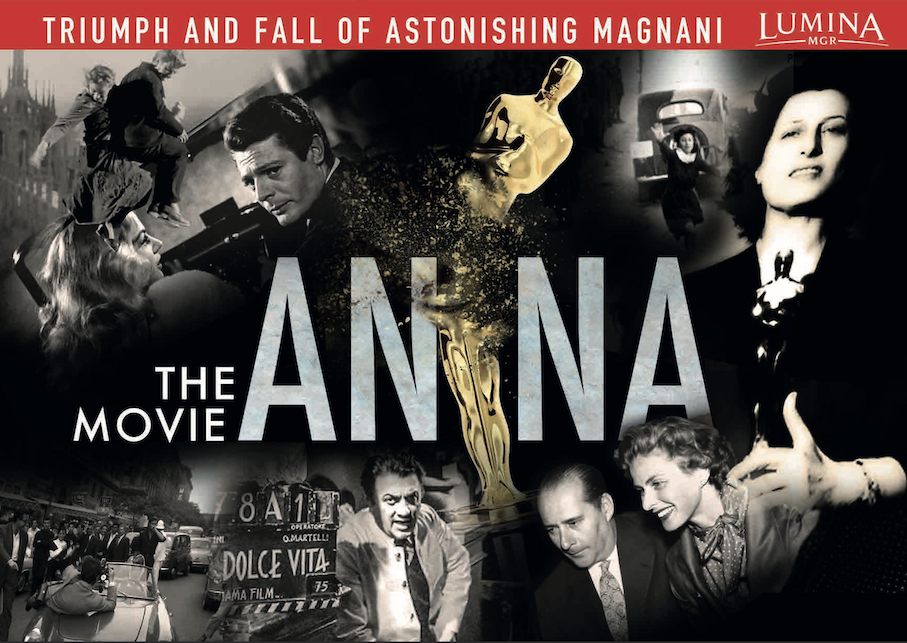September 26th marks 50 years since her passing. It’s time to remember her with a film. But not a biography or a documentary, instead, a visionary film that allows us to enter the torment and passion, the feelings and art of the first Italian actress to win an Oscar, the wildest, the most indomitable: Anna Magnani. This is what another great Italian actress intends to do; one who is able, like Magnani to go from theater to cinema to television, platforms, and now film directing, with absolute naturalness and the same indomitable passion. We’re talking about Monica Guerritore.
Monica as “Anna,” in a film she wrote, with the collaboration of the recently deceased Andrea Purgatori, and directed and produced by her. LUMINAMGR is the production company created by the actress, together with her husband Roberto Zaccaria, to produce quality content; “Anna” will be the first. It already has funds from the Ministry of Culture, RAI Cinema, a co-production with Swiss company Catpix and an agreement with Masi Film Srl. But Monica Guerritore also intends to start a crowdfunding, a fundraiser on a platform like Kickstarter, the one that Spike Lee and other young filmmakers have used, because she wants viewers to become active agents of the production process, as well. And she also wants American viewers to participate, which is why we’re meeting in her bright Roman home to talk about this project and what will be the first film fundraiser launched in Italy.
“It’s a call to action that puts the power of citizens, of the public, inside the process of making the film,” she tells us, adding that she has included the public in the creative process as well: “the intention was to consider the public as a focus group, proposing technical readings of the script, of writing the film.” So, Monica did public readings of the script in some theaters to study and possibly use audience reactions.
“Now everything is ready, but I had to struggle and, I’ll tell you” — she pauses in puzzled amazement – “I didn’t think I would struggle so much. In my dream world I thought: 50 years after the death of Magnani, an actress who brought Italian cinema to the world, a courageous, proud woman, there will be a wave of enthusiasm at the idea of making a film about her…And instead, there is such a concern on the part of the production world to make ends meet, that they tell you: ‘Ah Magnani, let’s make a six-part series.’ But I want to make a film, not a series, and they say: no, the proceeds are not guaranteed — even though it’s a biopic that will be able to be seen all over the world.
What film do you have in mind?
A visionary work about her, Rome by night, waiting for the Oscar, an original story. We don’t know what Magnani did on Oscar night, just as no one knows what Napoleon did before the Battle of Waterloo, but many have written about it, the gaps are filled in by storytellers. So, I imagined that she would not be waiting by the phone. When I pictured the black phone on the bed and her in her slip waiting for the call, I was reminded of “The Human Voice,” where the phone is synonymous with pain, and I thought she would run away from it. I speculated that she put on a coat and went out, because she was a cat lady, she lived by night, she was the one who started the Via Veneto nightlife that Fellini later used in “La Dolce Vita,” she was of a nocturnal nature, she would mess around in bars at night, with the waiters getting angry at her.
Did you read extensively about her?
No, I did as with “Joan of Arc” (N.B.: text written directed and performed in theater by Monica Guerritore). I took one thing here, one thing there. The ‘no’ to “La Ciociara”: I asked myself what happened? Why? Moravia had given the rights to Ponti with the understanding that she would be in it, so what? Why did Magnani say no? What happened in that office? I imagined a story: Ponti, who wanted Loren, made her say no,. He proposed something unacceptable, to which she said no.
Anna Magnani is the latest in a series of special women you have brought to the stage, from Alda Merini to Oriana Fallaci, Judy Garland, Joan of Arc…. What do you want to tell us with “Anna”?
A full, complex female figure, great even in age, full of past and present, with her courage, her ability to endure. Because she endured: she intelligently returned to the theater, from where she began. It is a fullness of a life that touches its peak in Rome, at dawn, the Oscar, and then the slow decline with all the pains of her love life. Anna Magnani was the last great performer who wrote, participated in the script writing — a true creator of moments that are works of art. If you remember the walk she does in “Mamma Roma”, her running in “Rome, Open City” and then the cry that Strehler filmed when she did “The Good Woman of Setzuan,” and the scream she lets out , ‘Help, help!’ on the bench with the little girl in “Beautiful”: those are artistic moments that she should have the rights to, because she created them, and they are works of art. All this ended after she won the Oscar, auteur movies came about, the various Bellocchios, Lattuadas, etc., arrived, and she was relegated to the sidelines — her talent became cumbersome, and that was unbearable for her.

After the pandemic, you’ve been working a lot
Since before, since I started to take over the reins of my career: I have ideas in my head, and I try to realize them. I have never had much luck in cinema because like Magnani, I am a cumbersome character, however, at a certain point comedy came along, from “The Worst Week of My Life” to “You Can Kiss the Groom” with Abatantuono, films that made a lot of money, and they understood that I also made people laugh. And so came the film that would take me to Magnani: Francesco Totti’s mother [in “Speravo de morì prima”]. I had to bring out my Roman streak, Fiorella Totti is a real she-wolf, Mama Roma is Fiorella Totti, and so I began to work on this Roman-ness that became the flywheel for the series with Verdone, “Life As Carlo.” Then in the spring I filmed a series for Netflix, which will be viewable in America in 2024, which is called “Gold Digger,” directed by Pappi Corsicato, with Giacomo Gianniotti who did 7 seasons of Grey’s Anatomy. There is a young lover with a mature woman, and it is not clear what her intentions are: a story I loved because it shifts the age of the main character a lot — twenty years ago she would have been a 40-year-old, now she is a 60-year-old. In the fall I’m filming a series, then I have to study the choreography for my next play, Ginger and Fred, which I am also directing.
So, no time to come and promote crowdfunding in America?
Ah, no, but if the conditions arise, if NIAF, (the National Italian American Foundation) or the Italian Cultural Institute invite me, I will take a plane and come!













